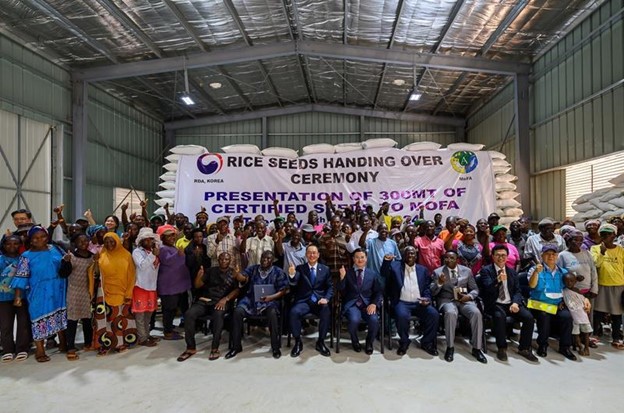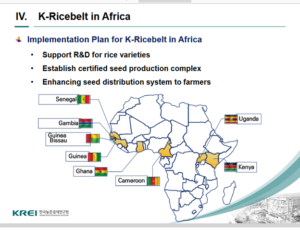
Ghana, Guinea, Guinea-Bissau, Gambia, Senegal, Cameroon, Uganda, and Kenya are benefiting from a South Korean developmental initiative as a swift response to the danger over food security in Africa by helping these countries to increase rice production and reduce their reliance on imports.
Known as the K-Ricebelt project, it is aimed at providing small farmers in the beneficiary countries with resilient rice varieties to combat the challenges posed by the climate crisis and it is the Republic of Korea’s official development assistance (ODA) project, aimed to contribute to achieving zero hunger in Africa by building rice seed production complexes in African countries, producing high-yielding rice seeds, and supplying them to farmers.
Data from the Korean Ministry of Agriculture says in 2023, the government started a pilot project to produce rice seeds in six African countries, funded by the budget of the Korea Partnership for Innovation of Agriculture (KOPIA), and achieved a fruitful outcome of producing 2,321 tonnes of rice seeds. This figure exceeded the initial production target of 2,040 tonnes by 14 percent.
The countries were Ghana, The Gambia, Senegal; Guinea, Cameroon and Uganda
Below are the production figures of the participating countries
- 330 tonnes in Ghana;
- 180 tonnes in The Gambia;
- 66 tonnes in Senegal;
- 1,119 tonnes Guinea;
- 111 tonnes in Cameroon;
- 515 tonnes in Uganda.
| Country | K-Ricebelt Seeds Produced |
| Ghana | 330 tonnes |
| The Gambia | 180 tonnes |
| Senegal | 66 tonnes |
| Guinea | 1,119 tonnes |
| Cameroon | 111 tonnes |
| Uganda | 515 tonnes |
Ghana has already taken delivery of the 330 tons of rice seeds from 60 hectares of land for rice cultivation secured by KOPIA Ghana Center. The seeds are Korea-Mo and Agyapa, both of which are based on Korean varieties, and Agra, which is based on a Ghanaian type.
The project aims to increase an annual production of high-yielding rice seeds to 10,000 tonnes by 2027
The initiative is the Korean’s president Yoon Suk Yeol’s commitment to overhaul South Korea’s foreign policy that is expected to take a more active part in international affairs.
The project offers hope to small farmers by introducing outstanding rice varieties that can withstand adverse climate conditions, ensuring improved yields and food security and produce rice seeds that are more suited to local conditions and have yields that are two to three times higher than domestic varieties.
In order to distribute 10,000 tonnes of rice seeds year starting in 2027, South Korea will spend more than 100 billion won (US$77 million) on the initiative over the following four years, according to data from the Korean agricultural ministry. Although it still largely depends on some food imports, South Korea has been able to grow enough rice to satisfy more than 90% of the domestic demand.
The Economic Community of West African States (ECOWAS) reports that although rice is a basic food in West Africa, only around 60 percent of the demand is met locally. This indicates that the area is very vulnerable to changes in trade and price volatility throughout the world.
In order to distribute 10,000 tonnes of rice seeds year starting in 2027, South Korea will spend more than 100 billion won (US$77 million) on the initiative over the following four years, according to data from the Korean agricultural ministry.
Although it still largely depends on some food imports, South Korea has been able to grow enough rice to satisfy more than 90 percent of the domestic demand.
The project is open to any government agency in Africa interested in improving rice productivity by using high yielding rice seeds.











